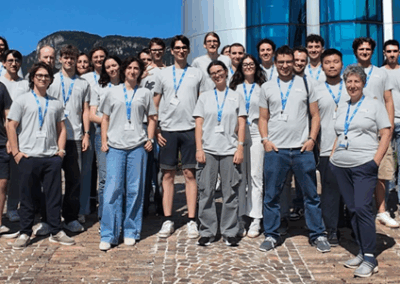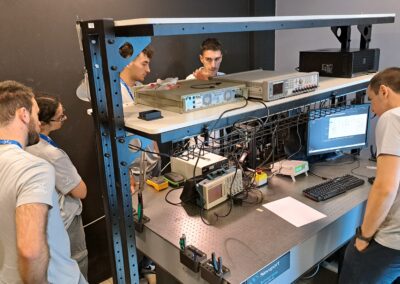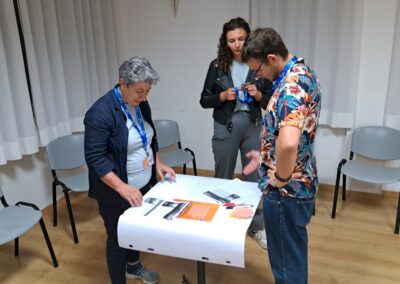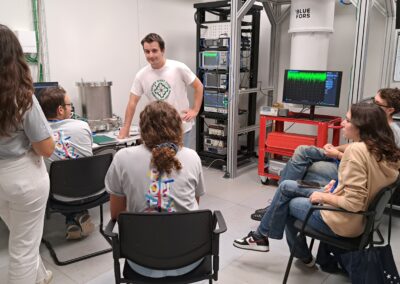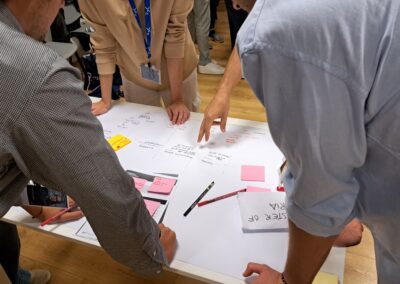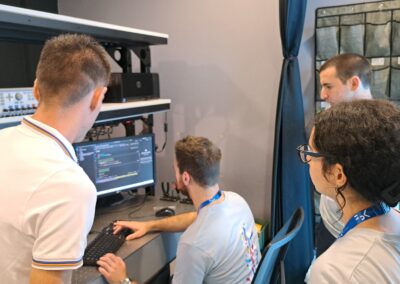Discover your path in Quantum Technology
The FBK Pioneers in Research Summer School is an innovative program crafted to immerse students in the dynamic field of microelectronics technology. The focus of 2025 edition will be on Quantum Technologies. Taking place from September 8th to 12th, 2025, this event offers a unique opportunity to engage with cutting-edge research and gain practical experience in a non-traditional academic setting. Participants will delve into semiconductor device fabrication entering state-of-the-art cleanrooms and characterization laboratories.
Students will have the possibility to follow step by step the fabrication of devices supported by senior researchers. Besides this unique opportunity, they will enter the “quantum experience” thanks to dedicated lessons and hand-on on superconducting and photonics topics.
The program is designed to bridge the gap between theoretical knowledge and real-world applications, preparing students to become leaders in scientific innovation.
Program Structure
Our 5-day program, from September 8th to 12th, is meticulously structured to offer a comprehensive understanding of quantum technologies, blending theoretical learning with practical application. The schedule will run mostly from 9:00 AM to 5:00 PM, leaving evenings free for participants to explore the city of Trento or gather informally with fellow pioneers for discussion, networking, and relaxation.
Cleanroom micro-nanotechnologies
- Fabrication of sensors: entering the state of the art FBK cleanrooms where silicon sensors are fabricated to learn about main technologies transforming silicon wafers into highly performing sensors and detectors.
- Device characterization and dicing: to complete the way to the applications, chips must be measured, and cut out from the wafer. This module will bring you into testing and dicing laboratories
- Materials Characterization: this session is dedicated to materials characterization techniques and their critical role in the advancement of quantum technologies. The aim is to provide a general introduction, with a specific focus on the quantum phenomena underlying many modern analytical methods. The presentations will explore a range of spectroscopic and microscopic techniques, emphasizing their application in the development of nanomaterials and their contribution to emerging quantum devices and systems.
Questions we will try to answer with you:
How does a cleanroom work? How is a silicon sensor fabricated? How to understand if a chip is working or not? What are the applications of this technology? What are the skills required to play in this field?
Quantum Technologies
- Superconducting quantum platform – Superconducting circuits – basics and hands-on: Qubits are the fundamental building blocks of quantum computers and they can be implemented using superconducting circuits fabricated on silicon chips. We will review the basic working principles of superconducting quantum and we will see how these circuits are designed, microfabricated and operated at millikelvin temperatures.
- Photonics quantum platform – Integrated photonics – basics and hands-on:
Photonic integrated circuits (PICs), in analogy to their electronic counterparts, allow for dense integration and transformation of macro-optics setups into tiny circuitries. When guiding single photons – photonic Qubits – PICs are excellent candidates for qubit pair generation and quantum optical experiments on a chip-scale. We will explain how PICs operate and the methods for their design and fabrication. - Single photon sources – Single-photon sources are essential components in quantum technologies, enabling applications in quantum metrology and sensing, quantum computing, and quantum communication. In this session, we will introduce the main characteristics of single-photon sources, including their emission properties and key performance metrics. This will be followed by an experimental session dedicated to their spectral characterization.
- Single-photon image sensors for quantum applications – Classical imaging systems, such as optical microscopes, are limited in what they can see by physical limits (such as diffraction) and technological limits (image sensors are not perfect). Quantum imaging techniques overcome the limitations of classical imaging systems playing with the properties of quantum light sources. In this session, we will introduce the main capabilities of single-photon imagers and their main performance indicators. We will then enter the lab to play with the devices and check the presence of spatio-temporal correlations in a photon flux.
Social impacts and ethical issues
In this session, we will introduce and analyse the aspects involved in “quantum society”:
- Worldwide Quantum readiness, Ethical challenges of quantum development, governance and democratization of technologies and research.
- Dilemma Between Research and Innovation: Nanotechnologies for the Next Quantum Technology (QT) Revolution.
- Moreover, Potential breakthroughs and political disruption will be discussed
Hands-On Laboratory Activities
Quantum Circuit Exploration
Engage in the design and testing of quantum circuits, gaining practical insights into their functionality and applications.
AI Sensor Integration
Discover the integration of AI technologies with quantum sensors, enhancing data processing capabilities in real-time.
Material Characterization
Participate in advanced material characterization techniques, crucial for developing next-generation quantum devices.
Photonics Applications
Delve into the world of photonics, exploring its role in quantum technology and its potential industrial applications.
Quantum team @FBK
Students will work side by side with some of FBK’s most skilled researchers, gaining insight, mentorship, and hands-on experience at the forefront of scientific innovation.

Lorenza Ferraio

Antonino Picciotto

Federica Mantegazzini

Mher Ghulinyan

Elena Missale
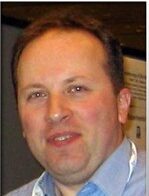
Massimo Bersani

Rossana Dell’Anna

Andrea Pedrielli

Leonardo Gasparini

Massimo Gandola
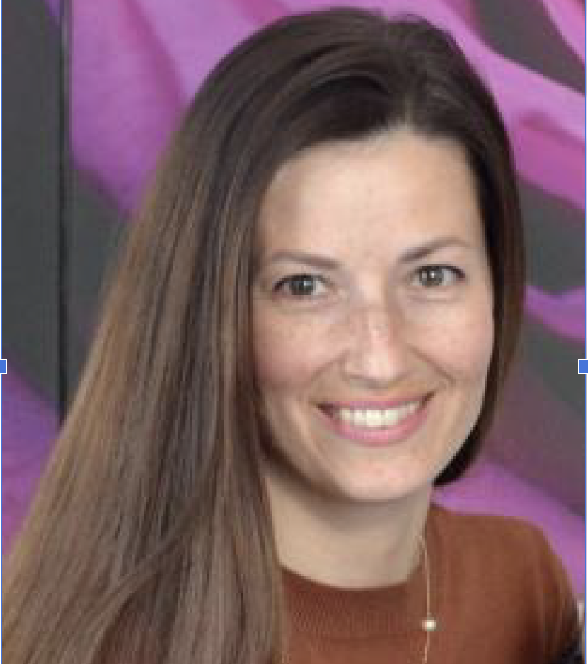
Alina Samusenko

Danny Zanardo

Francesca Mattedi

Andrea Rodoquino

Sara Hejazi

Manuel Rezza
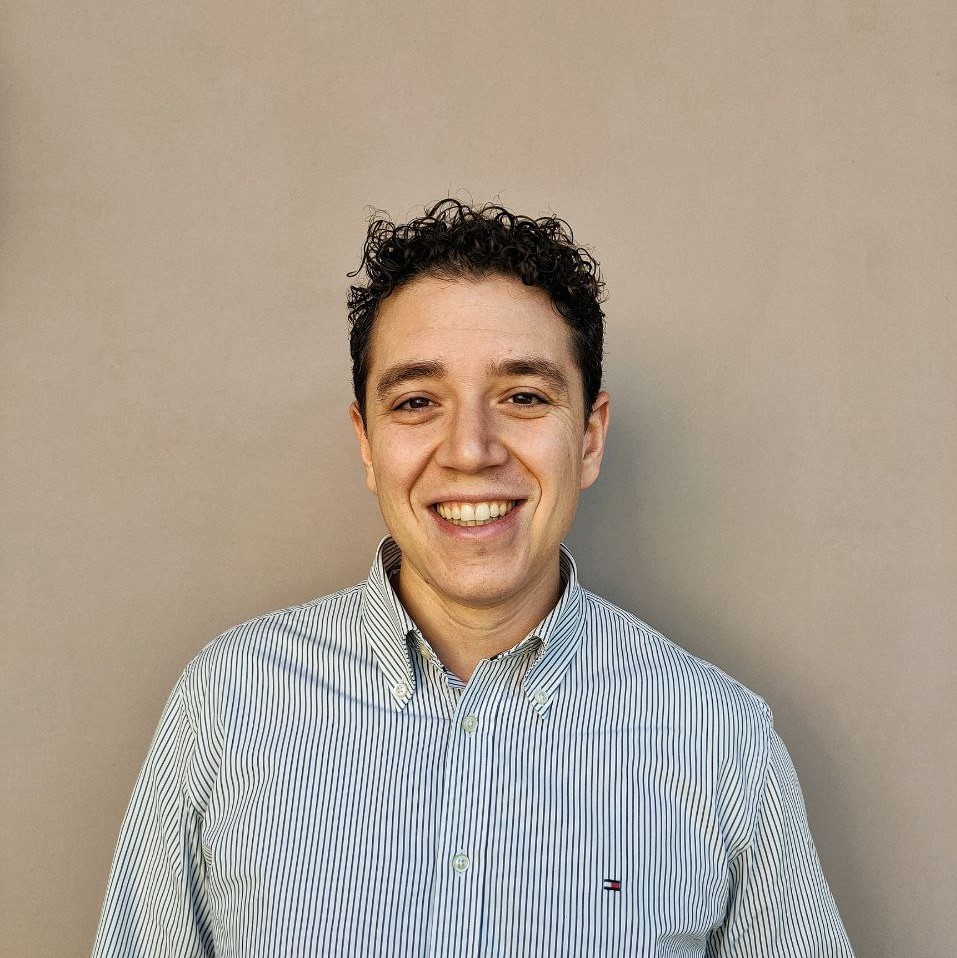
Elia Scattolo
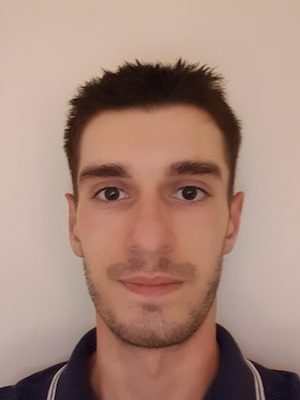
Gianpietro Maddinelli

Nicolò Crescini

Yong Kwon

Leonardo Limongi

Martino Bernard

Felix Ahrens

















